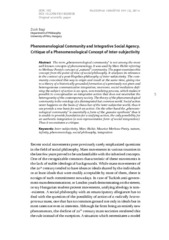Phenomenological Community and Integrative Social Agency. Critique of a Phenomenological Concept of Inter-subjectivity
Fenomenoloska zajednica i integrativna drustvena delatnost. Kritika jednog fenomenoloskog pojma inter-subjektivnosti
Апстракт
The term „phenomenological community“ is not among the most well-known concepts of phenomenology. It was used by Marc Richir referring to Merleau-Pontys concept of „natural“ community. The paper examines this concept from the point of view of social philosophy. It analyses its relevance in the context of a post-Hegelian philosophy of inter-subjectivity. The com¬munity conceived this way is origin and result at the same time, giving rise to a theory of a historically grounded formation of a previously not given and heterogeneous communicative integration; moreover, social mediation defi¬ning the subject of action is an open, non-totalizing process, which makes it possible to conceptualize an integrative action that does not neutralize the heterogeneity of the contemporary society. The theory of the phenomenological community is the ontology of a disintegrated but common world. Social action never happens on the basis of chaos but of the inter-subjective world, thus it can provide a new ...basis for such an action. On the other hand the phenome-nological community“ is essentially a form of the „passive synthesis“ thus it is unable to provide foundation for a unifying action, the only possibility for an authentic integration (a non-representative form of social integration).
Thus it necessitates a critique.
Кључне речи:
personality enhancement / intentionality / counseling / intersubjektivnostИзвор:
Filozofija i društvo / Philosophy and Society, 2014, 5-18Издавач:
- Beograd : Institut za filozofiju i društvenu teoriju
Институција/група
IFDTTY - JOUR AU - Bagi, Zsolt PY - 2014 UR - http://rifdt.instifdt.bg.ac.rs/123456789/206 AB - The term „phenomenological community“ is not among the most well-known concepts of phenomenology. It was used by Marc Richir referring to Merleau-Pontys concept of „natural“ community. The paper examines this concept from the point of view of social philosophy. It analyses its relevance in the context of a post-Hegelian philosophy of inter-subjectivity. The com¬munity conceived this way is origin and result at the same time, giving rise to a theory of a historically grounded formation of a previously not given and heterogeneous communicative integration; moreover, social mediation defi¬ning the subject of action is an open, non-totalizing process, which makes it possible to conceptualize an integrative action that does not neutralize the heterogeneity of the contemporary society. The theory of the phenomenological community is the ontology of a disintegrated but common world. Social action never happens on the basis of chaos but of the inter-subjective world, thus it can provide a new basis for such an action. On the other hand the phenome-nological community“ is essentially a form of the „passive synthesis“ thus it is unable to provide foundation for a unifying action, the only possibility for an authentic integration (a non-representative form of social integration). Thus it necessitates a critique. PB - Beograd : Institut za filozofiju i društvenu teoriju T2 - Filozofija i društvo / Philosophy and Society T1 - Phenomenological Community and Integrative Social Agency. Critique of a Phenomenological Concept of Inter-subjectivity T1 - Fenomenoloska zajednica i integrativna drustvena delatnost. Kritika jednog fenomenoloskog pojma inter-subjektivnosti SP - 5 EP - 18 DO - 10.2298/FID1402204F ER -
@article{
author = "Bagi, Zsolt",
year = "2014",
abstract = "The term „phenomenological community“ is not among the most well-known concepts of phenomenology. It was used by Marc Richir referring to Merleau-Pontys concept of „natural“ community. The paper examines this concept from the point of view of social philosophy. It analyses its relevance in the context of a post-Hegelian philosophy of inter-subjectivity. The com¬munity conceived this way is origin and result at the same time, giving rise to a theory of a historically grounded formation of a previously not given and heterogeneous communicative integration; moreover, social mediation defi¬ning the subject of action is an open, non-totalizing process, which makes it possible to conceptualize an integrative action that does not neutralize the heterogeneity of the contemporary society. The theory of the phenomenological community is the ontology of a disintegrated but common world. Social action never happens on the basis of chaos but of the inter-subjective world, thus it can provide a new basis for such an action. On the other hand the phenome-nological community“ is essentially a form of the „passive synthesis“ thus it is unable to provide foundation for a unifying action, the only possibility for an authentic integration (a non-representative form of social integration).
Thus it necessitates a critique.",
publisher = "Beograd : Institut za filozofiju i društvenu teoriju",
journal = "Filozofija i društvo / Philosophy and Society",
title = "Phenomenological Community and Integrative Social Agency. Critique of a Phenomenological Concept of Inter-subjectivity, Fenomenoloska zajednica i integrativna drustvena delatnost.
Kritika jednog fenomenoloskog pojma inter-subjektivnosti",
pages = "5-18",
doi = "10.2298/FID1402204F"
}
Bagi, Z.. (2014). Phenomenological Community and Integrative Social Agency. Critique of a Phenomenological Concept of Inter-subjectivity. in Filozofija i društvo / Philosophy and Society Beograd : Institut za filozofiju i društvenu teoriju., 5-18. https://doi.org/10.2298/FID1402204F
Bagi Z. Phenomenological Community and Integrative Social Agency. Critique of a Phenomenological Concept of Inter-subjectivity. in Filozofija i društvo / Philosophy and Society. 2014;:5-18. doi:10.2298/FID1402204F .
Bagi, Zsolt, "Phenomenological Community and Integrative Social Agency. Critique of a Phenomenological Concept of Inter-subjectivity" in Filozofija i društvo / Philosophy and Society (2014):5-18, https://doi.org/10.2298/FID1402204F . .


